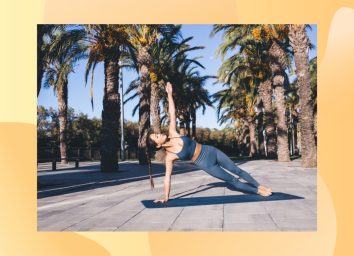Light vs. Heavy: Which Weights Are Best for Sculpting Toned Arms?
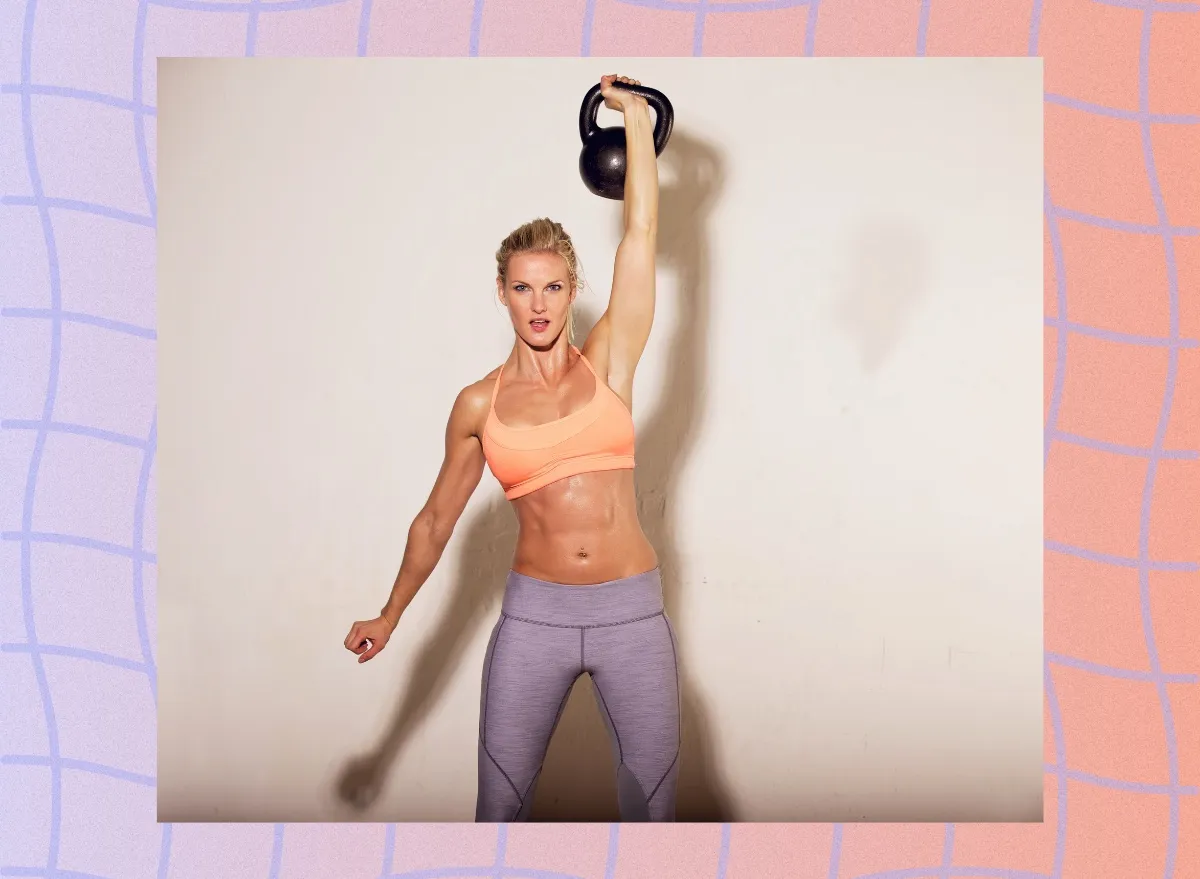
Introducing the age-old debate: Light or heavy weights—which reigns supreme in sculpting toned arms? In the quest for chiseled biceps and defined triceps, the choice between lighter or heavier weights can be perplexing.
In my years of coaching, I've come to realize that there isn't necessarily a right or wrong answer to the question of whether to lift heavy or use lighter weights. My consensus is that it's a case-by-case scenario, and you should do what works best for you, your fitness level, and your goals. But that isn't the answer everyone is always looking for.
Below, I give my reasoning for how and why you should train to achieve toned arms while dishing out a few benefits of lifting both light and heavy in your workouts. Ultimately, you'll reap more benefits by being consistent, making an effort in your workouts, and maintaining a regimen of exercise, a healthy diet, and a recovery plan.
The benefits of lifting light weights:
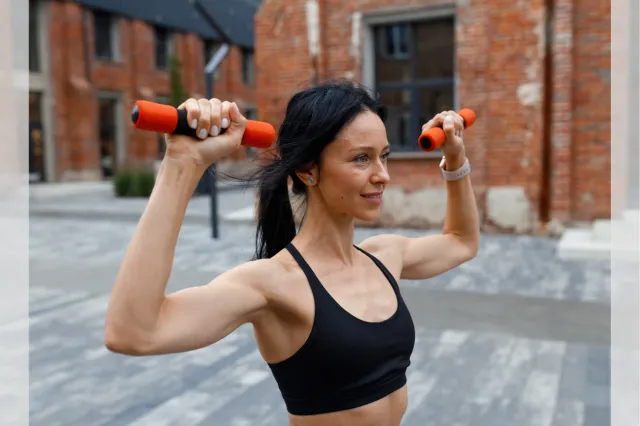
Lifting light weights offers many benefits for achieving toned and sculpted arms. This is particularly advantageous for beginners diving into resistance training. Here's why:
Lighter weights provide a gentle introduction to lifting for beginners who are just getting into resistance training. They allow beginners to learn proper movement patterns without the risk of strain or injury and establish a foundation that sets the stage for mastering more complex exercises down the road.
Light lifts help build a foundational level of strength, essential for progressing to heavier weights and more challenging exercises. It allows muscles to adapt and grow stronger gradually.
Lastly, working with lighter weights can be less intimidating for newcomers, boosting their confidence as they witness improvements in their strength and endurance over time. This positive reinforcement encourages them to stick with their fitness journey.
Next, lifting light weights with higher repetitions can also stimulate muscle hypertrophy. This leads to a more defined and sculpted appearance in the arms—especially when combined with proper nutrition and recovery. Lifting lighter weights is also excellent for improving muscle endurance, as it requires sustained effort over multiple repetitions. This endurance contributes to toned arms and enhances overall functional fitness.
Exercises with lighter weights offer variety and seamlessly integrate into high-intensity interval training (HIIT) and circuit training routines. Incorporating these exercises into such workouts adds variety, increases calorie burn, and promotes overall cardiovascular health while targeting specific muscle groups for toning.
The benefits of lifting heavy weights:
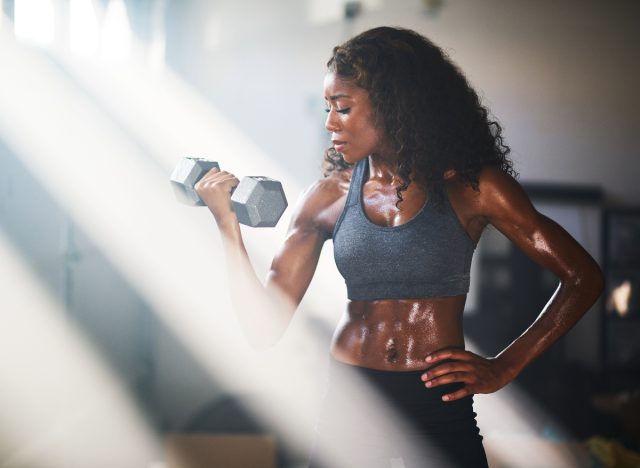
Lifting heavy weights offers a plethora of benefits for those aiming to sculpt lean muscle mass and achieve a sleeker physique, particularly in the arms. Heavier weights are instrumental in stimulating both strength gains and muscle hypertrophy. When you lift heavier weights, you subject your muscles to greater tension, triggering the physiological response that leads to muscle growth and increased strength.
You can also lift heavier weights for more sets with fewer reps to achieve the same volume of work as using lighter weights. For example, you could do 10 sets of five reps for barbell rows compared to five sets of 10 reps. By lifting heavier, you can reach the desired muscle fatigue and stimulus level in fewer repetitions, optimizing your training efficiency.
Additionally, lifting heavier weights progressively enhances your overall strength levels. You can lift heavier weights for more significant work as your strength improves, creating a positive feedback loop where increased strength enables you to handle even heavier loads, pushing your muscles to adapt and grow.
It's essential to note that the classification of "lighter weight" varies depending on individual fitness levels and goals. What may be considered heavy for one person could be light for another. Therefore, continually challenging yourself with progressively heavier weights tailored to your abilities is vital to maximizing muscle growth and achieving a sleeker, more defined arm physique.
Light or heavy weights: Which is better for toned arms?
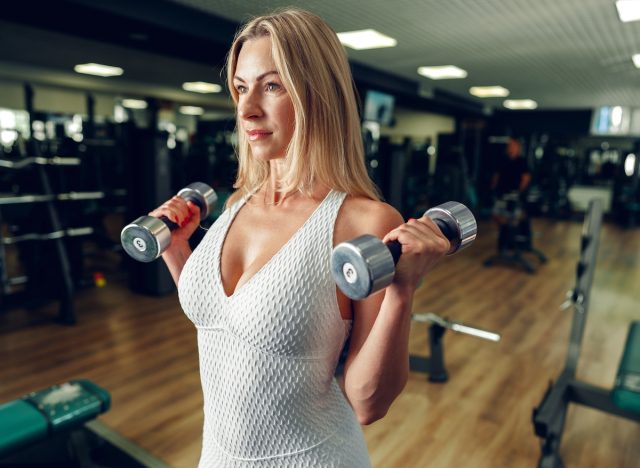
The debate between lifting lighter or heavier weights always arises when it comes to achieving toned arms. While both approaches have merits, lifting heavier weights (typically) yields superior results for achieving toned arms. Heavy lifting promotes muscle hypertrophy and strength gains, which are crucial for sculpting lean muscle mass and defining arm muscles. Moreover, lifting heavier weights challenges the muscles more intensely, leading to greater muscle activation and growth. However, incorporating a variety of weights and rep ranges into your training regimen can offer a well-rounded approach, ensuring optimal muscle development and definition for toned arms.
The crucial factor lies in lifting weights that provide sufficient stimulus for muscle growth without sacrificing form or pushing beyond your limits. It's important to understand that lifting heavy weights doesn't equate to attempting to reach the maximum weight possible. Instead, focus on selecting weights that challenge your muscles appropriately and allow you to maintain proper technique throughout each repetition.


